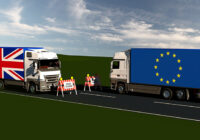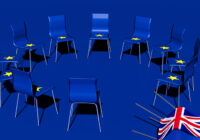Among the consequences of Boris Johnson’s greatest accomplishment, Brexit, the question looms of the possible imminent fracturing of the union of nations known as the United Kingdom. The act of shattering one union — the EU — may have launched a trend.
As the second most important political entity of the British union, Scotland sees its quest for independence as symmetrical with Britain’s withdrawal from Europe. The Scots have long felt as oppressed by the English as the Brexiters felt oppressed by Brussels. Moreover, Scotland has traditionally felt a strong kinship with Europe. It once took the form of the Auld Alliance, established in 1295 by France’s Philippe IV, as both nations opposed England. The idea of the alliance resurfaced in the troubled period after James II, the last of the Stuart kings of England, was forced to flee to France following the 1688 Glorious Revolution.
More recently, following the hesitating but finally successful integration of Great Britain into the EU in 1975, Scotland reveled in its European status. In June 2016, the Brexit referendum that then-Prime Minister David Cameron agreed to hold shocked the world by producing a victory for the “leave” camp. Scotland, however, unambiguously favored remaining in the European Union by a score of 62% to 38%. Nicola Sturgeon, Scotland’s first minister, immediately saw a reason to hold a second referendum for Scottish secession from the UK, an initiative that had been attempted but failed in 2014. Today, the polls indicate a clear majority of Scots will vote for independence. This time around it will be justified by the UK’s effective withdrawal from Europe. Scotland feels a deeper loyalty and kinship to Europe than to England.
When Will Boris Johnson Be Committed?
The Scots are nevertheless divided. Breaking with England would revert to a situation that hasn’t existed since 1707, the year the Treaty of Union was signed. Creating a border between Scotland and England in the 21st century will likely be more of a challenge than the knotty quandary still facing Northern Ireland concerning the unsettled question of a border that may need to be enforced with the Republic of Ireland, which is still part of the EU. The Roman Emperor Hadrian may have presciently anticipated the question of Scottish independence when he ordered the construction of his famous wall in 122 AD.
As disappointment with Brexit increases and polling shows the Scots as likely to show the same alacrity to exit their union as the Brexiters did with regard to the European one, the minority of Scottish “remainers,” known as unionists, are beginning to worry. To understand the nature of their panic, Al Jazeera quotes one unionist, Sheena Francovich, a retiree from Argyllshire on Scotland’s west coast: “As far as I’m concerned, we had a vote [in 2014] and we voted to stay part of the UK and that’s end of story. Nobody has ever convinced me that [independence] would make any economic sense. If there was another vote and people did vote [Yes] it would be a sad, sad day.”
Today’s Daily Devil’s Dictionary definition:
Economic sense:
The idea that better economic conditions will result from a choice the person speaking has already made, despite having no access to the full range of factors that determine economic success or failure.
Contextual Note
Brexit has been officially in place for a month and a half. One commentator highlighted the gap that has become evident between the promises Prime Minister Boris Johnson made five years ago and the reality of what is turning into a new winter of discontent: “During the 2016 Brexit campaign, proponents promised businesses that leaving Europe would mean liberation from suffocating regulations and infernal bureaucracy that supposedly prevailed across the Channel. It was all a lie. Post-Brexit, British companies that trade with the EU now deal with expensive disruptions to their businesses, and watch as their export profits plunge.”
Boris Johnson and his cohorts cannot complain that it’s all because they haven’t had enough time to prepare. The Europeans were ready to allow the UK more time, but it was Boris who insisted that it was crucial to “get Brexit done.” The long-term consequences of Brexit, including the eventual dismantling of the United Kingdom, are unknown. But the short-term consequences have given an idea of the scope of the material and economic damage. It will take longer to assess the psychological and cultural damage.
This will, of course, be compounded by the incalculable effects of the COVID-19 pandemic, not just on the economy, but on the entire youth of the nation. This is occurring at a curious moment of history, marked in recent decades by the vaunted interdependence associated with the idea of globalization. The edifice has begun to shatter, with nothing stable in view to replace it. Sheena Francovich may be right to say that any nation’s independence makes no “economic sense” — but neither does dependence.
On Sunday, for the first time, pro-independence parties have won a majority in Catalonia’s regional parliament, putting pressure on Spain to take into account a powerful centrifugal force that has been building for some time. The Catalans are already watching closely the drama unfolding in Scotland, hoping the much clearer case for Scottish independence prevails. Fragmentation as a reaction to decades of forced globalization may become a dominant trend of the 21st century.
It doesn’t even stop there. The world has entered into a new era of uncertainty concerning the way people imagine their future. This has always been the biggest intangible factor of stability for any society. Political and cultural disarray has become the norm throughout the West and across much of the globe, including another “united” nation, the USA. The events of January 6 in Washington, DC, may portend the disunifying of the entity celebrated as “one nation, indivisible,” a scenario difficult to imagine. There are nevertheless telltale signs of serious cracks in the national narrative that, unlike the Liberty Bell in Philadelphia, famous for its crack, offer no reassurance about a tranquil future.
Historical Note
The UK became united only slowly and in a largely haphazard way. When Elizabeth I, the Virgin Queen, died in 1603 leaving no successor to perpetuate the Tudor line, the rules of monarchy required seeking a new king among her cousins, the Stuarts. The nearest of kin was the reigning king of Scotland, James VI, son of Mary Stuart, Mary Queen of Scots, who was martyred by her cousin Elizabeth for remaining loyal to the Catholic faith. Elizabeth’s father, Henry VIII, to seal his divorce from Catherine of Aragon, had assumed the equivalent of papal authority over the newly created Anglican Church.
The accession of the king of Scotland, who now became James I of England, established the Stuart family as future heirs to the throne. All did not go well. James’s son, Charles I, was dethroned and decapitated by Oliver Cromwell after a civil war in which the Roundheads (the anti-Anglican Puritans) defeated the Cavaliers (the royal army).
When, following the restoration of the monarchy, James II, son of Charles II and grandson of James, declared his Catholic faith and, to add insult to injury, had a son with his Catholic wife, the defenders of Protestant England were upset enough to stage a coup. A bloodless revolution took place. The Protestant establishment celebrated it as the Glorious Revolution. Luckily for the revolutionaries, James II’s first daughter, Mary, had had the good sense to marry a Dutch Protestant, William of Orange, and the couple were called back from the continent to reign over England.
Mary’s sister Anne became queen in 1702. Under her reign, the Acts of Union were ratified by the English and Scottish parliaments respectively, creating the United Kingdom of Great Britain. The 18th century witnessed the rapid expansion of the British empire. Scotland tagged along with the triumph, though sometimes grudgingly. The last attempt at securing Scotland’s independence was led by the Stuart pretender, Bonnie Prince Charlie, who had returned to Scotland from France via Ireland. The Scots and their allies were defeated ingloriously at the 40-minute battle of Culloden in 1746 by the equally inglorious duke of Cumberland, known to this day as “Stinking Billy.”
Though the Scots quickly gave up on the hope of a Stuart restoration, they have never really forgotten the humiliation of Culloden. Brexit, for many Scots, is another Culloden.
*[In the age of Oscar Wilde and Mark Twain, another American wit, the journalist Ambrose Bierce, produced a series of satirical definitions of commonly used terms, throwing light on their hidden meanings in real discourse. Bierce eventually collected and published them as a book, The Devil’s Dictionary, in 1911. We have shamelessly appropriated his title in the interest of continuing his wholesome pedagogical effort to enlighten generations of readers of the news. Read more of The Daily Devil’s Dictionary on Fair Observer.]
The views expressed in this article are the author’s own and do not necessarily reflect Fair Observer’s editorial policy.
Support Fair Observer
We rely on your support for our independence, diversity and quality.
For more than 10 years, Fair Observer has been free, fair and independent. No billionaire owns us, no advertisers control us. We are a reader-supported nonprofit. Unlike many other publications, we keep our content free for readers regardless of where they live or whether they can afford to pay. We have no paywalls and no ads.
In the post-truth era of fake news, echo chambers and filter bubbles, we publish a plurality of perspectives from around the world. Anyone can publish with us, but everyone goes through a rigorous editorial process. So, you get fact-checked, well-reasoned content instead of noise.
We publish 2,500+ voices from 90+ countries. We also conduct education and training programs
on subjects ranging from digital media and journalism to writing and critical thinking. This
doesn’t come cheap. Servers, editors, trainers and web developers cost
money.
Please consider supporting us on a regular basis as a recurring donor or a
sustaining member.
Will you support FO’s journalism?
We rely on your support for our independence, diversity and quality.






